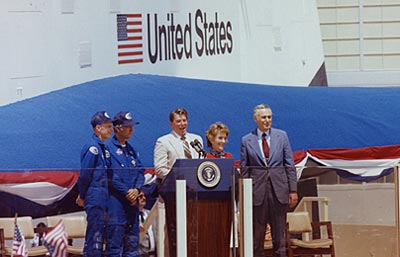|
|
 Ronald Reagan speaking after the landing of the shuttle Columbia on mission STS-4 in 1982. (credit: NASA) |
Ronald Reagan’s space policy legacy
by Taylor Dinerman
Monday, June 7, 2004
No President in my lifetime, not Eisenhower, not Kennedy, and certainly none of the others, could inspire the American people as Ronald Reagan could. Remember the story of Pandora’s Box. When she opened it, all the misery of the world flew out—greed, hatred, pain and suffering. She closed the box, but then she heard a small voice that said, “Let me out. I am hope!” In 1980, at a moment of near despair in America, our nation was being humiliated by the hostage takers in Iran. The Soviet Union was moving from triumph to triumph in Asia, Africa and Latin America. Terrible things came out of the 1970’s, but the last thing to emerge from that decade was a great soul that brought us the gift of hope.
In March 1983, he announced that America was going to begin serious research on missile defense. This changed the basic nature of the Cold War. Before that, the competition was centered around the numbers and destructive capability of nuclear missiles. It was a race the USSR would always win. After the “Star Wars” speech, the competition now was to see which side had the better technology, and the Communist empire had no hope, whatsoever, of defeating America in that domain.
In 1984, he decided to build an orbital habitat that he called Space Station Freedom. After the Challenger explosion, in February 1986, he reaffirmed America’s vocation to lead humanity out into the solar system and then onto the stars. Nothing would better symbolize Reagan’s hopes and dreams than for an American to be the first to set foot on Mars, and nothing would fit his philosophy better than if it were to be private enterprise that got us there.
| Nothing would better symbolize Reagan’s hopes and dreams than for an American to be the first to set foot on Mars, and nothing would fit his philosophy better than if it were to be private enterprise that got us there. |
President Reagan was the greatest champion of human freedom in the second half of the 20th century. I was there in Geneva, in 1985, when he first met Mikhail Gorbachev. His optimism, his self-confidence, and his belief in America and in America’s historic mission, made it his summit. The pack of cynics in the press expected that the younger, intellectually vigorous, Soviet leader would leave the older “simplistic” Reagan gasping for air. Instead, it was the Communist czar who ended up on the losing end of the argument.
The great ideals that Ronald Reagan communicated to the American people and to the world are the same ones our nation is fighting for in Iraq and Afghanistan. Today, our prayers are with our troops and with the President’s family. May God bless them all.
Taylor Dinerman is editor and publisher of SpaceEquity.com.
|
|
